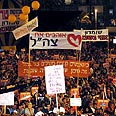
Much ado about nothing
Pullout and public debate surrounding it ignore real problems facing Israel
The withdrawal from Gaza hasn't happened yet, but already everyone is talking about the move's "historic meaning" to the State of Israel.
Essentially, the obsession with the withdrawal (it's pointless to call it a "disengagement plan"; after all, there is no plan and there won't be any disengagement) shows how much Israeli society has changed in 37 years regarding questions of territory and settlement.
If anything has been proven in the past year and a half, it is that almost nothing - no public debate and no moral standing – has taken place about anything other than where exactly in the West Bank the very temporary borders of Israel will run.
This absurdity is accompanying the pullout at every step, and despite all claims to the contrary, despite the series of feverish interviews with Brigadier-General Ibal Giladi, who claims that the plan was set in motion back in 2001, there has never been an organized disengagement plan that properly planned for the day after the pullout.
Ariel Sharon, who vehemently opposed the idea of leaving Gaza less than a year before proposing that same move, has not changed his spots. Sharon refuses to discuss what exactly he sees happening after the unilateral move; he even refuses to admit that the move is not even unilateral. But the most interesting thing is not the leadership of the prime minister, but the response of the Israeli public.
During the past year, we learned that there is no right or left in Israel. There are those in favor of leaving the territories and those who are against it. The right was generally, in the democratic world, the side that emphasized the need for a sovereign state first, who’s strength lay in guaranteeing its citizens' rights. The left prioritizes the rights of the citizen first, and views the instruments of power with suspicion.
Using the state
But in Israel, the right views the state as an instrument to serve its real goal – holding on to the occupied territories. When the state deviates from that path, it is permissible to disobey orders and to disregard the police, to rebel against the authority of the government and of the Knesset.
And the left? When the government serves its sole interest of leaving the territories, then the individual has no freedoms. Protest is suddenly a “rebellion against the authority of the state and an attempt to prevent the government from realizing its decision.”
A respectable newspaper has called for the problem of prime ministerial corruption to be put aside until after the disengagement, and a journalist, no less respected, said, “the media is always in favor of upholding the law.”
The holding of meetings with the PLO was also against the law in Israel, and in other countries the law prevented blacks to sit with whites on the bus. However, it seems that according to the enlightened left, the media’s job is to be in favor of the law.
The disengagement will not chance the situation in Gaza, and will wield even less influence in the West Bank, where it is not at all clear what will transpire after the evacuation of four settlements. It’s fair to assume that immediately after the pullout, Israel will experience political dizziness, which usually results in a silencing of diplomatic initiatives.
But the really serious problems – the lowly public dialogue, the disorganized and wretched way in which the pullout will be carried out, the disappearance of institutions – all these will haunt us long after the last of the homes will be evacuated.
These problems should worry us much more than the danger of Qassam rocket attacks against Ashkelon from Gaza, the danger of which has been used to terrify us for so long.










